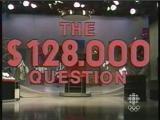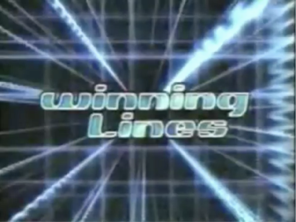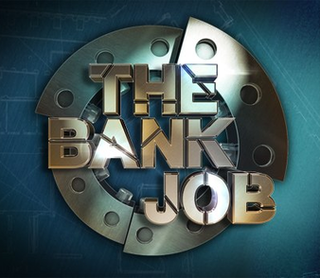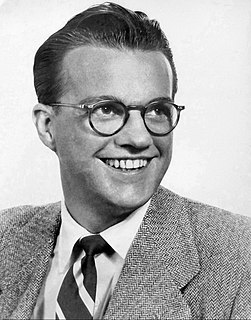
Trivia Trap is an American game show produced by Mark Goodson Productions. It was created by producer Goodson and originally ran from October 8, 1984 to April 5, 1985 on ABC. The game featured two teams of three contestants each who competed against each other to answer trivia questions in various formats. Bob Eubanks was the host, and Gene Wood announced during the first two weeks. Charlie O'Donnell announced during the third week and was replaced by Bob Hilton for the remainder of the series.

Hot Potato is a television game show that was broadcast on NBC in the United States from January 23 to June 29, 1984. From April 23 until its conclusion, the show was known as Celebrity Hot Potato.
The Joker's Wild is an American television game show that has aired at different times since the 1970s. Contestants answer questions based on categories determined randomly by a mechanism resembling a slot machine. The show's title refers to the game's slot-machine mechanism also having jokers.

Now You See It is an American television game show created by Frank Wayne for Mark Goodson-Bill Todman Productions. The object of Now You See It is to answer general knowledge trivia questions by finding the answers hidden in a grid, similar to a word search puzzle.

Chain Reaction is an American game show created by Bob Stewart, in which players compete to form chains composed of two-word phrases.
Time Machine is an American game show where contestants compete to answer trivia questions about popular culture and recent history to win prizes. The show aired on NBC from January 7 through April 26, 1985, and was hosted by John Davidson. Charlie Tuna was the announcer, with Rich Jeffries as his substitute. Reg Grundy Productions produced the series, and upon its premiere Time Machine was one of three Grundy series airing on NBC.
Trump Card is an American syndicated game show that aired from September 10, 1990 to May 24, 1991. and was hosted by Jimmy Cefalo. Debi Massey served as hostess and Chuck Riley was the announcer. The show was produced by Telepictures Productions, Createl, Ltd., and Fiedler-Berlin Productions, with Warner Bros. Television distributing. It was based on the British game show Bob's Full House, which consisted of contestants trying to answer questions to fill up a 15-square bingo board.

Dream House is an American game show that saw contestants competing to win, as the title of the show indicates, a new house. The show originally premiered in primetime on ABC on March 27, 1968, with a daytime edition premiering on April 1, 1968. The primetime series aired weekly until September 19, 1968 and the daytime series aired daily until January 2, 1970. The daytime series was revived for NBC's daytime schedule and premiered on April 4, 1983, running until June 29, 1984.

Debt was an American game show hosted by Wink Martindale which aired on Lifetime from June 3, 1996 to August 14, 1998. The show featured contestants who were trying to earn money to get out of debt.
Three on a Match is an American television game show created by Bob Stewart that ran on NBC from August 2, 1971 to June 28, 1974 on its daytime schedule. The host was Bill Cullen and Don Pardo served as announcer on most episodes, with Bob Clayton and NBC staffers Wayne Howell and Roger Tuttle substituting at times.

Gameshow Marathon is an American television program which aired on CBS from May 31 to June 29, 2006. It is based on the United Kingdom series Ant & Dec's Gameshow Marathon which aired on ITV in 2005. It also aired in Canada on CTV.

The $128,000 Question is an American game show which aired from 1976–1978 in weekly syndication. This revival of The $64,000 Question was produced by Cinelar Associates and distributed by Viacom Enterprises.
Pass the Buck was an Australian game show hosted by John Burgess based on the American game show of the same name, airing on the Nine Network from 11 February 2002. Burgess began hosting the show after five years of hosting Burgo's Catch Phrase. Before Pass the Buck went to air, Nine's Director of Programming at the time, John Stephens, was confident of Burgess as host, stating that he would "make the transition [from Burgo's Catch Phrase] to the new format without missing a beat".
Chain Letter is an American game show produced by Stefan Hatos-Monty Hall Productions that aired on NBC during the summer and early-fall of 1966. Comedian Jan Murray hosted this game show, while Wendell Niles did the announcing.

Winning Lines is an American game show that aired from January 8 to February 18, 2000, the day after its official cancellation. Based on the British version of the same name, it was considered as CBS's answer to the success of ABC's Who Wants to Be a Millionaire. Winning Lines was hosted by Dick Clark, directed by James Yukich and produced by Stone Stanley Entertainment in conjunction with the British production company, Celador. The announcer for the program was Chuck Riley.

The Bank Job is a British television game show broadcast live on Channel 4, hosted by George Lamb. It was first broadcast on 2 January 2012 and ended on 17 March 2012.
Pass the Buck was a BBC daytime game show that aired on BBC One from 12 October 1998 to 28 June 2000. The programme was first hosted by Fred Dinenage in 1998 and then hosted by Eamonn Holmes from 1999 to 2000.
L'eredità is an Italian Rai 1 game show. It premiered on 29 July 2002. From 29 July 2002 to 10 June 2006, it was hosted by Italian presenter Amadeus. He was succeeded by Carlo Conti who hosted the show until 14 April 2014, when he was replaced by Fabrizio Frizzi. Frizzi hosted until 23 October 2017, when he became ill during the taping of the next show and was taken to the hospital. Carlo Conti substituted for Frizzi from 30 October 2017 to 15 December 2017, and he hosted the special episode in tandem with Fabrizio Frizzi when the latter returned hosting the quiz. On 16 December 2017 Fabrizio Frizzi resumed hosting the show by himself until 25 March 2018. The next day, Frizzi died of a brain hemorrhage. Following a hiatus due to Frizzi's death, the game returns from 3 April 2018 until the end of the season with the host Carlo Conti. Since 24 September 2018, the new presenter of the game show is Flavio Insinna.

500 Questions is an American game show broadcast on ABC. The show premiered on Wednesday, May 20, 2015, at 8:00 pm EDT, and ran for seven straight weeknights, with a weekend break. The show features contestants who try to answer 500 questions without getting three wrong in a row. The series was renewed for a second season on October 1, 2015.
















